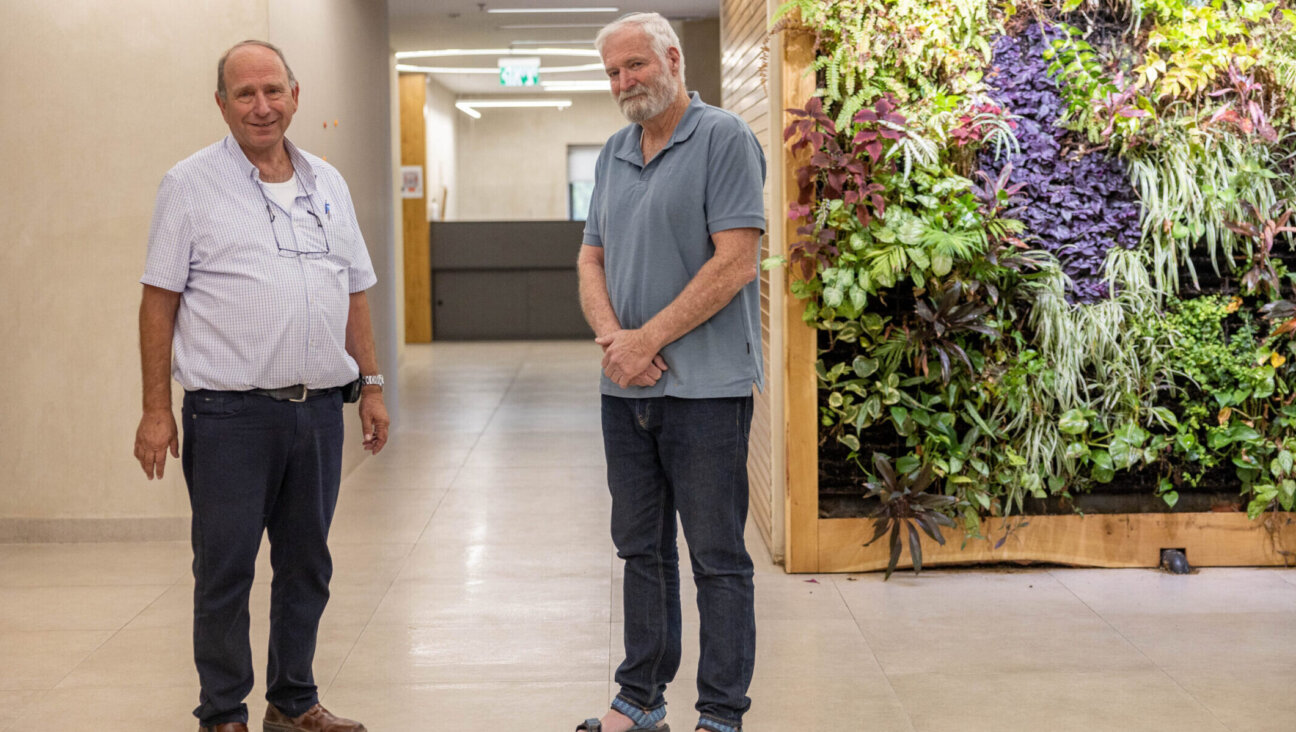September 2, 2005
Are Mainline Churches With Us or Against Us?
David Elcott correctly exposes the divide between anti-Israel Protestant radicals and the majority of mainline Christians, who are committed to fairness and realism in the Israeli-Palestinian conflict (“Divest Anti-Israel Prejudice From Churches” August 26). We should follow this point to its logical conclusion.
Protestant leaders need to know that they now face an unavoidable choice: They can work for understanding or align themselves with the ideologues. This choice is between either supporting the peacemakers or abetting the extremists, advancing just solutions or spouting partisan rhetoric, and moral credibility or irrelevance.
The defense of Israel is an existential issue for Jews. If church leaders choose the former path, they will maintain relations with the Jewish community. If they choose the latter path, they lose the trust of Jewish people everywhere. Mainline Protestant leaders can no longer have it both ways.
Rabbi Eugene Korn
Director of Jewish Affairs
American Jewish Congress
New York, N.Y.
No wonder David Elcott is angry. Christian churches that demand Israel “tear down the wall” while simultaneously promoting a divestment campaign against the nation are a disgrace. The wall was built not to deny freedom-loving citizens the right to travel, but to shield innocent people against terrorists. In short, no terrorism, no wall. What is it about this logic that these Christians don’t understand?
Elcott hopes that “the mainstream Christian churches” will not join in this anti-Israel crusade. One doesn’t have to agree with every decision made by Israel to understand how right he is. Indeed, it is up to Christian leaders to stop this effort dead in its tracks.
William Donohue
President
Catholic League for Religious and Civil Rights
New York, N.Y.
David Elcott will not gain friends in the Christian community by dismissing their concerns about the injustice and the brutality of the Israeli occupation. What does he think of the Israeli human rights groups that have voiced these same concerns for more than a decade?
In an article reprinted in the Forward in August 2003, former Knesset speaker Avraham Burg wrote, “We cannot keep a Palestinian majority under an Israeli boot and at the same time think ourselves the only democracy in the Middle East.”
Elcott concludes that “Christians and Jews must be partners in a coalition of peace and coexistence.” In a recent issue of the Christian magazine Sojourners, which focused on the Israeli occupation and the question of divestment, he can read articles from Christians and Jews who have been part of this coalition for many years.
Leila Richards
Brooklyn, N.Y.
No Laughing Matter
I am simply incredulous at the absolute nadir of insensitivity to which the Forward descended in running an article covering American late-night comics’ jokes about the Gaza withdrawal (“So a Soldier Goes into Gaza…,” August 26).
That these comedians could bring themselves to use the deeply traumatic uprooting of thousands of adults and children from their homes and livelihoods of decades as a springboard for cheap laughs might not surprise; their nightly stock in trade is prompting otherwise caring individuals to chortle at others’ misery. But for a Jewish paper to blandly report on this moral outrage against fellow Jews without so much as citing a dissenting voice, and to then append a summary of the various wisecracks, seemingly for the readers’ amusement — I had trouble trusting my eyesight.
This transcends one’s personal position on the merits of the withdrawal or one’s feelings toward those evacuated — to treat so coarsely a national crisis over which hundreds of thousands of Israelis of all stripes have just wept hot tears calls for an apology.
Eytan Kobre
Far Rockaway, N.Y.
Endorsing, Not Asking
I’m troubled by the recent decision of the United Synagogue of Conservative Judaism’s public policy committee to effectively endorse the nomination of John Roberts — and to make that endorsement on behalf of the entire United Synagogue in a letter to Senator Arlen Specter (“Synagogue Group Backs John Roberts Nomination,” August 26).
Surely a decision of this importance would require a vote of the entire board? Apparently not.
United Synagogue’s executive vice president, Rabbi Jerome Epstein, felt that it would have been impractical to bring the issue before the entire board. Impractical? Or just uncomfortable for those who support the nomination and would have to explain the reasons why?
I’m an officer in a small United Synagogue-affiliated congregation in Alabama. No one on our synagogue board would ever consider taking a position on any public issue without consulting the entire board and probably the membership, as well. We respect each other far too much to summarily remove anyone from the decision-making process on important issues.
It’s distressing to find out that some Conservative movement leaders don’t show each other — and the general membership — the same consideration.
Larisa Thomason
New Market, Ala.
Frank Talk on Chabad
Your article about Chabad on campus misses a few key points about the interactions between Hillel and Chabad (“Chabad Makes Major Inroads at Universities,” August 26).
Perhaps most important, the writer makes an erroneous distinction between Chabad being “religious” and Hillel being “social.” Most Hillels, in fact, provide a wide array of religious programming that is geared toward both the spiritual and intellectual values of college students. In the case of the Hillel at New York University, where until last year I served as director, there are rabbinical interns from across the denominational spectrum, all feeding the deep religious hunger of Hillel students in a campus environment that respects pluralism among Jews. Hillel is an open and flexible institution that truly meets young people where they are at.
Another issue that your article missed is the type of spirituality that Chabad offers — often mystical and in some cases blatantly messianic, which for the vast majority of college students is at best an amusement and, at worst, a turn-off. But beyond that is the question of methodology — using alcohol, often focusing on the “lost” student and, in particular, targeting non-Orthodox students in an effort to “bring them back” to tradition.
While it is true that some Chabad rabbis represent an intellectual rigor that fits the college campus, and have contributed enormously to many people’s lives, in many cases the emissaries use the aforementioned tactics to convey their message.
For the community to have the proper conversation about interactions with the majority of pluralistic institutions and Chabad, we need to have an honest airing of issues, from methodology, ideology and theology to politics.
Rabbi Andy Bachman
Brooklyn, N.Y.
It Takes Two To Tango
In his August 19 opinion article, Daoud Kuttab was disingenuous and deceptive in his criticism of Israeli “unilateralism” (“Mideast Peace Requires Withdrawal From Unilateralism”). He wrote: “It is simply naive to think that the partial return of our occupied lands will end Palestinian demands for full liberation and independence.”
Not only Hamas, but the PLO and the Palestinian Authority today consider their “occupied lands” to include all of British mandate Palestine, from the Jordan River to the Mediterranean. They consider all of Israel to be occupied Arab land: Their textbooks show no Israel, their maps show no Israel — even their crossword puzzles define Israeli cities as Palestinian Arab cities. How can Israeli policies be anything but unilateral when there is no partner for peace?
Carl Goldberg
Tempe, Ariz.
Hard-Hitting Jews
Your article on the Jewish boxer Dmitriy Salita is in error (“Pretender or Contender?” August 19). The writer has him aspiring to become “the first Jewish world champion since… the late 1970s.”
In fact, from 1980 to 1982, a Jewish fighter named Saoul Mamby, a junior welterweight like Salita and also from New York, where he was bar mitzvahed, held the world title.
Asked why he didn’t wear a Magen David on his trunks, as Salita does, Mamby replied, “They don’t ask Christians to wear a cross on theirs.”
Sanford Watzman
Denver, Colo.
A message from our CEO & publisher Rachel Fishman Feddersen

I hope you appreciated this article. Before you go, I’d like to ask you to please support the Forward’s award-winning, nonprofit journalism during this critical time.
We’ve set a goal to raise $260,000 by December 31. That’s an ambitious goal, but one that will give us the resources we need to invest in the high quality news, opinion, analysis and cultural coverage that isn’t available anywhere else.
If you feel inspired to make an impact, now is the time to give something back. Join us as a member at your most generous level.
— Rachel Fishman Feddersen, Publisher and CEO























